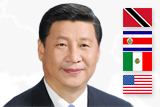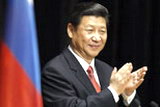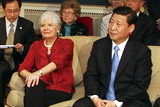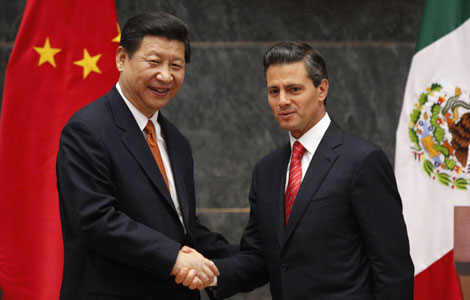Xi's trip to further boost China-LatAm ties
Updated: 2013-05-30 14:59
(Xinhua)
|
|||||||||
MEXICO CITY - China's ties with Latin American and Caribbean countries have been constantly strengthened in the past decade, and Chinese President Xi Jinping's upcoming trip to the region will give that relationship a further boost.
China-Latin America cooperation has been drawing more attentions from global media and scholars in recent years, and that has much to do with China's strong economic performance, the fast growth of the emerging economies such as Mexico and Brazil, and the increasingly close cooperation between China and the emerging economies in the region.
According to China's official policy paper toward Latin America and the Caribbean, Beijing believes the two sides are at a similar stage of development, face the same development task, and share a common aspiration to enhance mutual understanding and cooperation.
China and the regional countries hold the same or similar positions on issues related to economic globalization, maintaining global stability, a more just and fairer world economic and financial order, and the fight against terrorism.
In the 21st century, frequent high-level visits have given leaders of both sides chances to compare notes on global issues of common interests, supporting and coordinating with one another in the world affairs.
Political trust between the two sides has helped promote cooperation in economy, trade, science and technology, culture and education, opening up a new prospect for the development of bilateral ties in an all-round manner.
Two-way trade between China and Latin America doubled over the past decade, and last year saw the trade volume reach $261.2 billion.
The rapid trade growth has benefited the economic development of both sides. Some economists said it was the large amount of Latin American exports to China in recent years that has protected the region from the heavy blow of the worldwide economic crisis.
Meanwhile, the two sides also seek to promote mutual investment.
Expanding investment in Latin America is consistent with Chinese enterprises' "going-out" strategy, and also meets the needs for domestic economic and social development of Latin American countries.
At present, China's non-financial investment in Latin America amounts to more than 54 billion dollars, mainly in the fields of mining and energy.
Mexico, one of the three countries in the region President Xi will visit, is an important emerging market with which China has a strategic partnership.
Ulises Granados, a Mexican expert on China, said China-Mexico relations have experienced some ups and downs during the rule of previous Mexican governments, but the new president, Enrique Pena Nieto, attaches great importance to developing relations with China.
He believes Xi's visit will open up new prospects for bilateral ties, with Mexico hoping to expand cooperation with China in agriculture and animal husbandry, energy and tourism.
Costa Rica, also a destination on Xi's forthcoming trip, is the only Central American nation that has diplomatic ties with China. It has maintained close cooperative relations with China while China has invested heavily in Costa Rica, including a refinery project.
According to local media reports, Costa Rica hopes to expand exchange and cooperation with China in such fields as energy, trade, environment, infrastructure, education and culture.
Xi's visit to Trinidad and Tobago will mark the first time that a Chinese president visited the English-speaking Caribbean nation.
The Foreign Ministry of Trinidad and Tobago issued a communique emphasizing the contributions made by the Chinese in the country to local economic and cultural development.
With high expectations as such for the visit, the trip will undoubtedly push the bilateral relations to a new level.
Related Stories
President Xi to visit four countries 2013-05-30 13:56
President Xi visits Latin America, meets Obama 2013-05-29 16:43
President Xi meets with mayor of Los Angeles 2013-05-28 15:21
Xi-Obama meet a 'first step' 2013-05-29 17:14
Xi to meet Caribbean leaders 2013-05-29 16:21
Schedule










